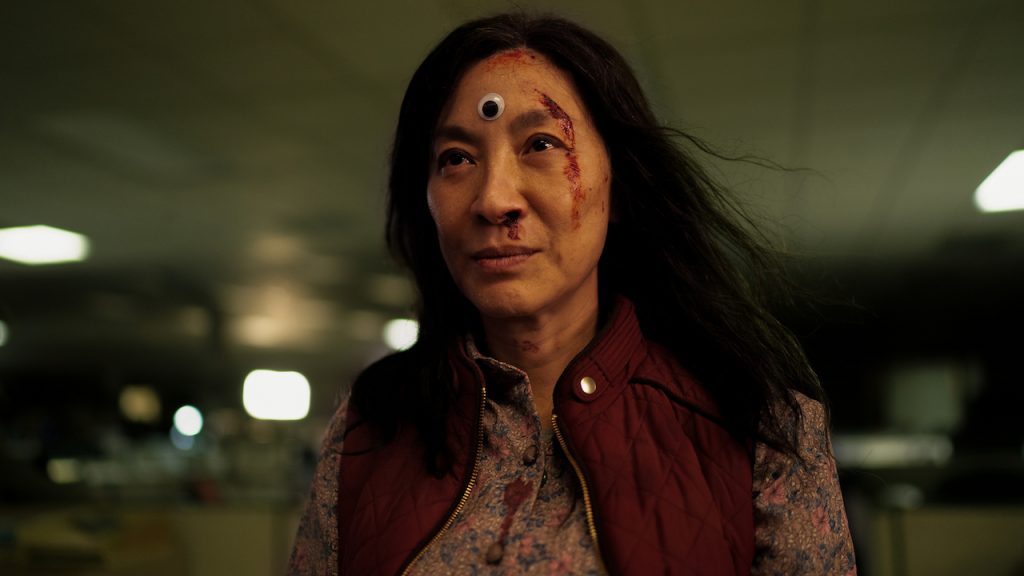Aanji Sin ‘24
Editor-in-Chief
Editor’s note: contains spoilers for Everything Everywhere All at Once.
There’s one film production company that does a multiverse like no one else, and I’ll give you a hint: it’s not Marvel.
A24’s Everything Everywhere All at Once follows a Chinese American family navigating the troublesome mundanities of everyday life: Evelyn Wang (Michelle Yeoh) runs the struggling laundromat below her apartment and is being faced with an IRS audit, while also trying to balance the expectations and health needs of her aging father (James Hong). Her husband Waymond (Ke Huy Quan), attempts to assuage some of his wife’s stressors, but feels undervalued and ignored in his own home, and seriously considers serving divorce papers. All the while, their directionless daughter Joy (Stephanie Hsu) puts more and more distance between herself and her parents due to her mother’s incessant nagging and their general reluctance towards accepting her girlfriend into their lives. But all of these seemingly tedious problems reach their head when Evelyn’s reality is disrupted and she is thrown into the chaos of the multiverse. She must master a skill known as “verse-jumping,” which allows her to access the thoughts, memories, and skills of her parallel universe selves, to defeat a great evil that threatens the destruction of reality as they know it!
The first thing I’ll say about Everything Everywhere All at Once is that all 139 minutes of the film feel exactly like its trailers — which is to say, a total fever dream. Mind you, it’s the best possible fever dream your subconscious could cook up. As Evelyn verse-jumps, we get glimpses into the lives that other Evelyns are living: a movie star, a severe teppanyaki chef, a martial artist with the world’s buffest pinky finger, a tender-hearted queer woman with sausage-like fingers and can play the piano with her toes (yeah, you read that right the first time). As her consciousness flips between universes, the film’s genre warps with it, switching from romance to comedy to a sci-fi drama until it becomes a monster of its own, refreshingly absurdist in every way.
Despite its main cast, Everything Everywhere is not a diaspora story. While you can and should regard the film as another monumental piece for the Asian American film canon, the film spends no time worrying itself with its racial identity, yet feels very distinctly, very familiarly Asian American. Joy’s strained conversations with her mother about her sexuality and her weight, threads of generational trauma, making jokes and switching seamlessly between English and Mandarin and Cantonese, even the offhanded remarks Evelyn makes about her husband’s incompetence — “honestly, I don’t know how your father would survive without me” — it was like I was watching my life up there, my entire existence on blast in the subtlest and most meaningful of ways, in a multiverse movie of all things.
I’m having trouble trying to find a note to end this on because Everything Everywhere simply cannot be contained in one ending comment; that’s kind of the entire point. It’s also where the film falls short in many aspects, sometimes feeling like you’re getting a pizza thrown at you (in a good way and a not-so-good way). It’s a lot to cram into one film without getting lost in the extraneous plot, but it accomplishes what it means to and has you trudging back to your car at 1 a.m. with unsteady legs and watery eyes (I mean, seriously, Mitski as the end credits? Are they trying to incapacitate me?). In the end, Everything Everywhere is just… everything. The dramatic, the hilarious, the way-too-real, the messy, the poignant — it’s everything, just as intended.
Image Source: CinemaBlend



